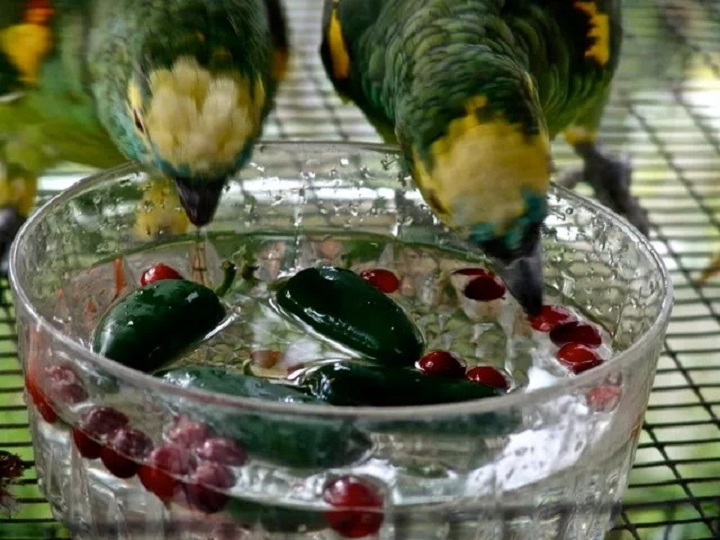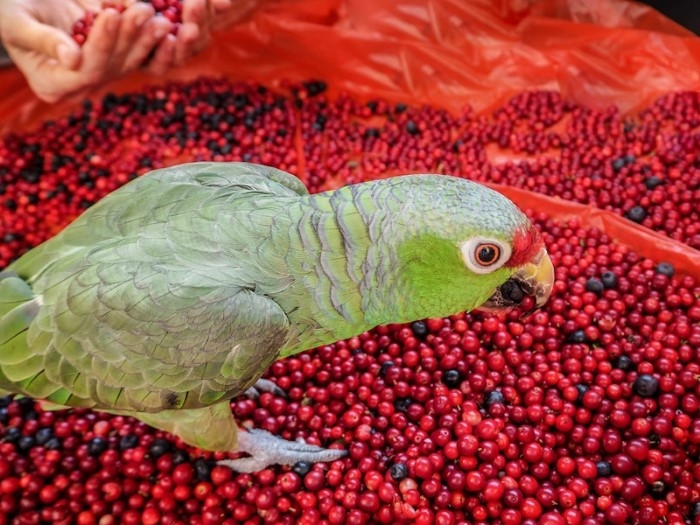Cranberries are tart, bright red berries often associated with holiday dishes and health foods for humans. But if you’re curious about wildlife dining habits, you may find yourself wondering—do birds eat cranberries? The answer is yes, many birds do enjoy cranberries, and they can even be a nutritious treat when served the right way.
Whether you’re a backyard birder, pet bird owner, or just love watching wildlife, understanding how cranberries fit into a bird’s diet can help you offer safe and tasty food options. Let’s explore which birds eat cranberries, their nutritional value, and how to offer them properly.
Do Birds Like Cranberries?
Many birds are drawn to cranberries, especially during colder months when natural food sources become limited. Though cranberries are tart to human taste buds, birds don’t mind the sourness and often find the bright color and high moisture content appealing.
Birds are attracted to:
- Brightly colored fruits like red berries
- Moisture-rich food during dry seasons
- Natural sugars and antioxidants
- Easy-to-access food sources in feeders or gardens
Even though cranberries are not as sweet as other fruits, birds still appreciate their nutritional benefits.
Which Birds Eat Cranberries?
Several types of birds enjoy cranberries either in the wild or when offered by humans in feeders or bird-safe treats.
Wild Birds That Eat Cranberries
- American robins – Love soft, ripe berries in gardens and shrubs
- Cedar waxwings – Known for their fruit-heavy diets
- Northern mockingbirds – Forage on fruits in fall and winter
- Bluebirds – Often eat dried or fresh berries from feeders
- Thrushes – Include cranberries in their varied fruit diet
- Starlings – Opportunistic feeders that enjoy all kinds of berries
- Finches and sparrows – Occasionally nibble on cut-up or dried cranberries
Cranberries are especially useful for birds during migration or in cold weather when insects are scarce.
Are Cranberries Safe for Birds?
Yes, cranberries are generally safe for birds when offered in moderation and in the right form. However, there are some important things to keep in mind.
Safe Ways to Offer Cranberries
- Fresh cranberries – Washed, chopped or halved for easier eating
- Dried cranberries (unsweetened) – Avoid those with added sugar or preservatives
- Cooked cranberries (plain) – No added spices, sauces, or sweeteners
- Mixed into suet cakes – Combine cranberries with seeds and fat for winter feeders
Always avoid offering cranberries from canned sauces, sugary snacks, or products that contain artificial ingredients.
Nutritional Benefits of Cranberries for Birds
Cranberries offer several health benefits to birds due to their natural nutrients and hydration properties.
What Cranberries Provide
- Vitamin C – Supports the immune system
- Antioxidants – Help reduce inflammation and oxidative stress
- Dietary fiber – Aids in digestion
- Hydration – Fresh cranberries contain a high water content
- Natural sugars – Provide quick energy for active birds
While they shouldn’t replace a bird’s main diet, cranberries make a healthy supplemental treat.
Feeding Cranberries to Pet Birds
Many pet birds—including parrots, cockatiels, and parakeets—enjoy fruit in their diet. Cranberries can be a fun and enriching addition to their meals when offered properly.
Tips for Pet Bird Safety
- Introduce cranberries slowly to see how your bird reacts
- Chop them into small pieces to prevent choking
- Only use plain, unsweetened varieties
- Remove uneaten fruit after a few hours to avoid spoilage
- Never serve cranberry sauce or sugar-coated snacks
Monitor your pet’s reaction, and consult a vet if you’re unsure about adding new fruits.
Best Times to Offer Cranberries
Timing matters when offering seasonal fruits like cranberries to backyard birds.
- Late fall and winter – When natural food sources are limited
- Migration periods – Provides energy for birds in transit
- Holiday seasons – Extra cranberries from recipes can be repurposed (unsweetened only)
- During dry spells – Helps hydrate birds when water is scarce
Cut-up cranberries can also attract birds to your yard for easier birdwatching.
Alternative Berries Birds Also Love
If you want to offer variety or can’t find cranberries, consider other bird-friendly fruits.
- Blueberries
- Raspberries
- Blackberries
- Mulberries
- Chopped grapes
- Chopped apple (no seeds)
- Dried currants (unsweetened)
These berries are often found in wild diets and provide similar benefits.
FAQs About Birds and Cranberries
Do birds eat raw cranberries?
Yes, many birds enjoy raw cranberries. Just wash them and cut them into small pieces to make eating easier.
Are dried cranberries okay for birds?
Only if they are unsweetened and free from additives. Avoid dried cranberries that contain added sugar or oil.
Can I mix cranberries into birdseed?
Yes. Chopped dried or fresh cranberries can be added to birdseed mixes or suet cakes for variety.
Will all birds eat cranberries?
Not all species are fruit-eaters. Insectivores or seed-eating birds may not show interest, but fruit-loving birds will enjoy them.
Can pet birds have cranberry juice?
No. Most commercial cranberry juice contains added sugar, preservatives, or other ingredients that are harmful to birds.




